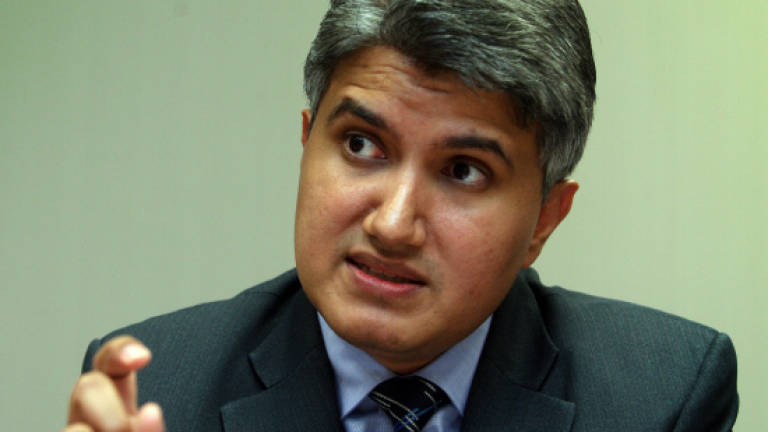Boustead Plantations to fertilise growth

PETALING JAYA: Boustead Plantations Bhd (BPB), which has plans to increase total planted area by 20,000 ha over the next five years, has drawn up a two pronged strategy to improve its operating efficiency and profitability moving forward through greater use of new planting materials and technics.
Its CEO Fahmy Ismail (pix) said BPB plans to increase the use of new high density planting materials by 300ha to 400ha each year and use new planting materials to increase oil yield extraction (OER) by over 20%.
"Our group's OER, from fresh fruit branched (FFBs) processed to crude palm oil (CPO) produced, has improved to 20.88% in the financial year ended Dec 31 2013, from 20.81% in the financial year ended Dec 31, 2012. This is higher than the national OER average based on Malaysian Palm Oil Board benchmarks," he told SunBiz in a interview recently.
He noted that BPB's mills in Sabah remain as its most productive, with an average OER of 21.12% for the financial years ended Dec 31, 2011, 2012 and 2013 compared to the Sabah MPOB benchmark of 20.94%.
"Our strong OER is primarily attributable to our crop, as our selection of planting materials has resulted in greater oil yields but smaller-sized kernels," he said.
In order to enhance its FFB and oil yields, since 1999 BPB have utilised new planting materials developed by its associate research company, Applied Agricultural Resources (AAR).
"Our commercial scale planting uses ramet materials, which are palms cloned from highly productive palms for high FFB and oil yields. Secondly, we are using compact palms for high density planting at 160 palms per hectare (ha)," he said.
To-date, the group has planted about 14,000 ha with the new planting materials, including clonal and semi clonal DXP seeds as well as high density planting materials.
Fahmy noted that most of BPB replanting use these new planting materials, along with other innovative planting materials being developed by AAR.
"The use of high density planting materials is crucial for us to obtain higher FFB yields and CPO production per ha of planted area."
"To date, we have about 700 ha planted with high density planting materials. As we move forward, we plan to plant 300 to 400 ha per year with high density compact palms, based on our current seed production," he said.
BPB growth strategies via replanting schedule with new planting materials and to increase total planted area by 20,000 ha from the current 70,991 ha over the next five years should improve the group's overall performance in the long run.
BPB plans to use RM420 million of the gross proceeds from its initial public offering (IPO) to part-finance the acquisition of 10,000 ha of plantation land within the next three years.
"We plan to acquire existing plantation estates and plantations reserve land primarily in Malaysia," Fahmy said.
However, he noted that the group is open to exploring other areas in the South East Asian region, should any viable opportunities arise. "We may also consider acquiring land in Indonesia, although this would be assessed on a case-by-case basis," he added.
A member of conglomerate, Boustead Holding Bhd, BPB is one of the most experienced and established upstream oil palm plantation companies in Malaysia with over 100 years of plantations business experience and close to 50 years of oil palm plantation estate management.
The group has a total of 41 palm oil plantation estates and 10 palm oil mills which are located in Peninsular Malaysia and in East Malaysia.
Fahmy also pointed out that BPB has been a member of Roundtable on Sustainable Palm Oil (RSPO) since 2004 and has to-date, invested over RM3 million in RSPO certification.
A total of 6,897 ha of BPB's plantation estates are RSPO accredited, namely our Sungai Jernih Business Unit, comprising the Sungai Jernih Palm Oil Mill and three plantation estates surrounding it, Bebar Estate, Sungai Jernih Estate and LTT Terengganu Estate.
"Moving forward, we will continue to implement sustainable agricultural practices at our plantation estates. In line with this, our Nak Business Unit comprising the Nak Palm Oil Mill and Nak Estate, Sutera Estate and Resort Estate, is expected to attain RSPO certification in 2014," he said.
BPB will raise RM928 million from its listing exercise which will take place this Thursday.
The pricing of RM1.60 per IPO share was based on an approximate 16 times price earnings multiple (PE) on an earnings per share (EPS) of about 10 sen.
On average, the historical PE for Malaysian plantation companies ranges from a minimum of 12.1 times to a maximum of 47.3 times.